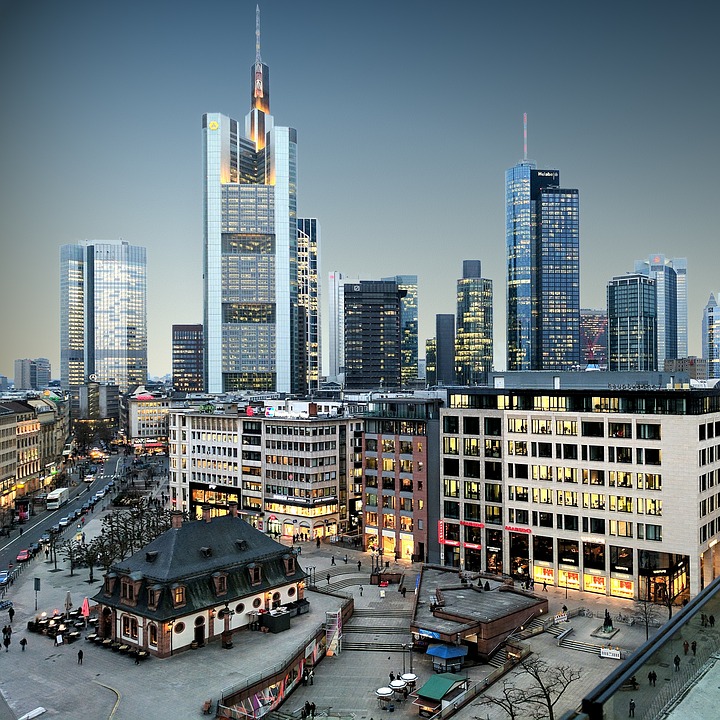Latest News
Frankfurt woos London bankers
March 21st 2018
 By "The economist", March 17, 2018
By "The economist", March 17, 2018
“This is our biggest asset!” gushes Eric Menges, the chief executive of the FrankfurtRheinMain promotional body, whirling his arm. The views from his panoramic office are impressive: Frankfurt’s skyscrapers and cranes to the east, its sprawling international airport to the south, the thick forests of Hesse and the vineyards and villages of the Taunus mountains, where Mr Menges lives, to the north and west. “For a 9am flight I can get up at 7am,” he boasts, as the shadow of an intercontinental airliner flickers over the tops of the pines. From this office he hopes to reinvent continental Europe’s financial centre, already home of the European Central Bank.
Brexit helps. Of the banking jobs that have left London since June 2016, more have gone to Frankfurt than anywhere else. After a recent visit Lloyd Blankfein, the chief executive of Goldman Sachs, tweeted provocatively: “Great meetings, great weather, really enjoyed it. Good, because I’ll be spending a lot more time there.” In the last month alone Deutsche Bank announced the relocation of its client business to Frankfurt and Credit Suisse moved 250 jobs there. But Emmanuel Macron, France’s president, is pushing for Paris and in November nabbed the London-based European Banking Authority. Frankfurt’s early lead may not hold: “The Brexit process is not complete,” cautions one top European banker. So Frankfurt’s marketing men, like Mr Menges, are stepping up.
They have their work cut out. Martin Luther called the city, for centuries a trading centre at Europe’s geographic crossroads, “a silver and gold hole”. It almost became West Germany’s capital after the second world war, but was deemed too big and money-focused, so Bonn won. Rebuilt in a rush and with lots of concrete after the wartime bombing raids, architecturally it ranges from the unremarkable to the hideous—though its skyline of skyscrapers is glamorous at night and gives the city the moniker “Mainhattan”. In the 1980s drug users were prominent in the centre and many residents moved out to Taunus villages. Even today the city is pretty quiet after 9pm.
Successive reinventions have been failures. Frankfurt was long pitched as a twee German city like Munich, complete with Christmas market and Ebbelwoi (the rather acidic local apple wine). “Not everyone likes Ebbelwoi”, jokes Hubertus Väth, the managing director of Frankfurt Main Finance, another promotional body. The city has also been called a new Berlin, but unlike Germany’s capital can hardly claim it is “poor but sexy”. If anything it is the opposite. Most recently, following the Brexit vote, it has been unfairly compared to London and Paris, banking cities four times its size. So its new image-makers are trying a new strategy: honesty about what the city is not.
Unlike traditional Munich, for example, Frankfurt is thoroughly modern. Over 40% of its residents are foreign. “I was born in Russia and lived in Algeria, France and Germany; we speak four languages at home; we are typische Frankfurter and kind of proud of it,” says Svetlana Kazantseva at the International School Frankfurt Rhein-Main. The city’s universities were the cradle of greenish German “new left” theorists, like Jürgen Habermas. Its clubs, like “Omen”, were the home of techno music. A bloom of hipster bars and restaurants is emerging in the old drug-scarred quarter around the main station, complete with avocado salads and flaxseed baguettes.
Unlike cash-strapped Berlin, Frankfurt is rich. The banks of the Main river boast walkways and skateparks; museums have been renovated; public transport now runs 24 hours a day at weekends. The city spends more per person on culture than any other in Germany. It is a “Berlin for adults”, Mr Väth quips. Frankfurt is investing in its musical heritage, pitching for festivals, building a Museum of Modern Electronic Music and last summer creating the “world’s largest club” in a sports stadium. A high-speed “club train” to Paris (“320km per hour, 130 beats per minute”) has become a fixture of the cultural calendar.
And unlike giant London or Paris, life in Frankfurt is convenient. Daily commutes are measured in minutes, not hours. Housing is fairly cheap. The airport—the third busiest in continental Europe—is 15 minutes from the city centre and a new terminal will open soon. Office space is plentiful and growing. Nineteen new skyscrapers are under construction and 26 more are planned. The number of international schools has risen from seven in 2000 to 28 today (though more will doubtless be needed). Young London bankers should not see Frankfurt as a place to live but a base for travel, says Mr Menges: “Here you are at the centre of the continent: Barcelona, Paris, Prague are all an hour away.”
All of which speaks to a broader truth. A new, continental London is not likely to materialise imminently. Instead bankers predict that Brexit will produce a network of specialised European financial centres. Back-office functions might gravitate to Warsaw or Bucharest, for example, and high-tech services to Berlin and Dublin. Frankfurt, like Paris and Amsterdam, should take euro-clearing and more traditional branches of investment banking. It is less clear whether Europe’s banks will eventually settle on a new hub. But if they do, Frankfurt will be a contender.